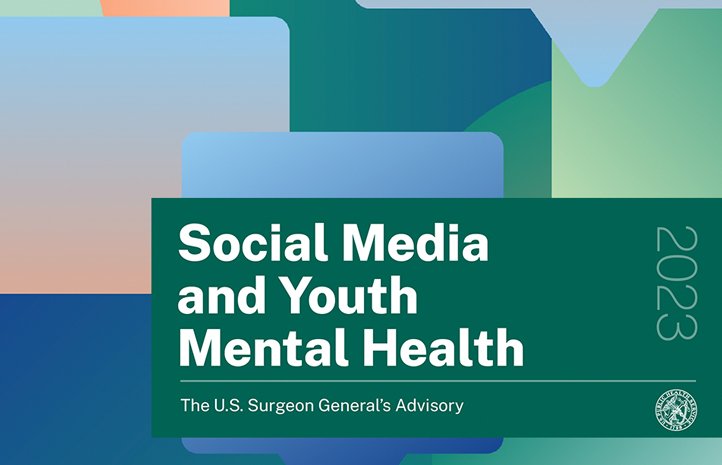On the occasion of Mental Health Awareness Month (celebrated every year in May), it is necessary to address this crucial issue concerning the young generation of India and the entire world. Younger generations, today, spend a significant portion of their time on social media platforms and are lost in algorithms.
Advisory on Social Media and Youth Mental Health
U.S. Surgeon General Dr Vivek Murthy on 23rd May 2023 issued an advisory on ‘Social Media and Youth Mental Health’ to address the urgent health issue of deteriorating mental health and well being of children and adolescents in the country. Dr Murthy highlighted that "there are ample indicators that social media can also have a profound risk of harm to mental health and well-being of children and adolescents".
He also acknowledged that complex factors influence the mental health of children and adolescents, for example, the amount of time, type of content, activities and interactions on the platform and to what degree these affect essential health activities like sleep and physical activities. Adolescence is a susceptible period of brain development where risk-taking behaviour reaches its peak.
Potential Harms of Social Media Use
Potential harms highlighted by the advisory are:-
1: Exposure to extreme, inappropriate and harmful content on social media platforms. Under certain tragic conditions, a number of childhood deaths were linked to suicide and self-harm-related content like Benadryl Challenges on TikTok and partial asphyxiation leading to seizures.
2: Body dissatisfaction, disordered eating behaviour, social comparison and low self-esteem, especially among girls and adolescents. All these are associated with depression, making them feel worse about themselves.
3: Exposure to hate-based content and abusive language perpetuating racism, cyberbullying, harassment etc., are correlated to depression among adolescents
4: Cybercriminals target children and adolescents, seeking to exploit them financially and sexually.
5: Dr. Vivek Murthy also highlighted the potential harms of excessive and problematic use of social media. These platforms are designed to maximise user engagement providing features like an endless scroll, autoplay, push notification and algorithmic play to display content. This compulsive behaviour has led to many problems like sleep problems, attention-seeking behaviour and fear of missing out among adolescents. Reduced sleep is a significant contributor to the increase in depression and anxiety. Problematic use has also been linked to attention-deficit/ hyperactivity disorder (ADHD) in adolescents.
We Must Take Action
Dr Murthty asserted that "to safeguard better the mental health and well-being of children and adolescents, policymakers, technology companies, researchers, families, and young people must all engage in a proactive and multifaceted approach."
1: Policymakers must play a crucial role in safeguarding youth from the risks associated with social media. They can strengthen protections by collaborating with stakeholders, ensuring the safety of children across all platforms. Developing age-appropriate health and safety standards for technology platforms is essential to address specific needs. Policymakers should also pursue policies that limit children's access to social media, minimising potential harm and enforcing age restrictions.
2: Technology companies are responsible for designing safe online environments and addressing the risks associated with social media. They should conduct transparent and independent assessments of the impact of their products on children and adolescents, sharing findings and data with researchers and the public while protecting privacy. Big Tech shall take steps to prevent misuse and mitigate adverse effects, for instance: forming an advisory committee with all important stakeholders to ensure a safe online space, prioritising user health and safety in product design, setting default settings to high safety and privacy standards for children, and adhering to and enforcing age minimums are essential. Companies should avoid features that maximise engagement at the expense of well-being and share relevant data with researchers. Additionally, creating effective systems to address complaints and threats to children promptly and transparently is crucial.
3: The onus of mitigating the potential harms of social media should not be placed solely on the shoulders of parents and caregivers. Still, there are steps they can take to help protect and support children and adolescents against the risk of harm. They can create a family media plan to establish healthy technology boundaries and open discussions about screen time, content boundaries, and personal information protection. Modelling responsible social media behaviour by limiting their own use, being mindful of what and how they share about their child, and practising positive online behaviour sets a good example. It is important to teach children about technology, discuss risks and benefits, and empower them to be responsible online participants. Reporting cyberbullying or online abuse and collaborating with other parents to establish shared norms and support programs around healthy social media use can create a collective approach.
4: Children and adolescents must follow certain steps to save themselves from the harm of the online world. They should ask for help when they encounter something negative or disturbing on social media, create boundaries between the online and offline world, adopt cyber healthy behaviour like not disclosing personal details on online platforms. They should be taught not to keep harassment or negative experiences a secret and tell parents, friends, or close family members about these incidents.
These are some tips mentioned in the advisory issued by U.S. Surgeon General. It also holds relevance in India as India is also struggling with the deteriorating mental health conditions of the younger generation.




